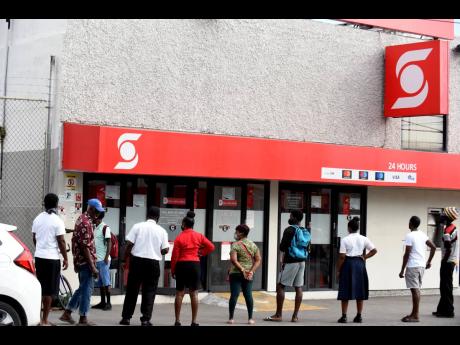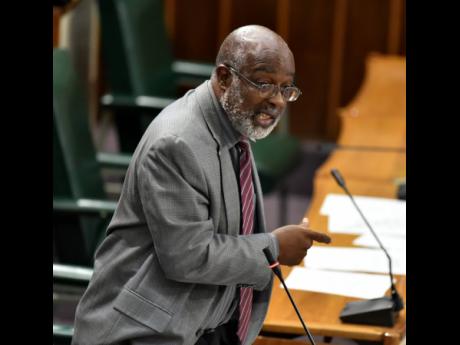MP Jackson sues Scotiabank over cheque-cashing fee
St Catherine Southern Member of Parliament Fitz Jackson has locked horns with Scotiabank Jamaica, filing a lawsuit in the Supreme Court challenging the legality of cheque-cashing fees imposed by the financial institution on its customers. The court...
St Catherine Southern Member of Parliament Fitz Jackson has locked horns with Scotiabank Jamaica, filing a lawsuit in the Supreme Court challenging the legality of cheque-cashing fees imposed by the financial institution on its customers.
The court action, which was set in motion last Tuesday by Jackson’s attorneys, sets the stage for a landmark ruling that could rock the local banking sector and provide a road map for challenging a range of fees imposed on the public, a matter which has triggered much outrage in recent years.
The lawsuit is based on a May 2019 incident in which Jackson, a five-term lawmaker, claimed he was compelled to pay a $385 fee before a teller at Scotiabank’s Portmore branch would cash a $2,500 cheque in his name.
He is seeking a declaration from the court that Scotiabank, through the imposition of the fee, has breached its obligation by failing to honour a negotiable instrument, according to court documents obtained by The Sunday Gleaner.
Section 73 of the Bills of Exchange Act defines a cheque as a negotiable instrument and stipulates that it must be honoured on demand without conditions, Jackson’s attorney, Anthony Williams, contended during an interview with The Sunday Gleaner yesterday.
“The moment the bank puts in conditions and says, ‘You have to give me $385 in order for me to change the cheque’… then you are making the cheque a conditional order,” said Williams, managing partner at Usim Williams and Company, which filed the lawsuit.
“It is an unconditional order. It is not a request,” he said, referring to a cheque presented for encashment.
For several years, Jackson has been waging a battle against commercial banks for what he calls “cruel, unreasonable and heartless deductions from account holders through a range of fee penalties”.
In 2017, he tabled a bill to amend the Banking Services Act, which would address the issue of high service fees charged by commercial banks. Jackson said the bill would “offer some protection to the public. This bill would allow account holders to make transactions against their own accounts without the penalty of fees”.
However, the bill has not received the support of the Parliament.
Last month, Finance Minister Dr Nigel Clarke disclosed in Parliament that seven of the eight commercial banks he checked with acknowledged that they charge a fee to “cover administrative costs associated with processing a cheque”.
Last year, local deposit taking institutions (DTIs) saw their profitability balloon due to increased reliance on non-interest revenues or fees, the Bank of Jamaica (BOJ) noted in its 2021 annual report.
According to the report, pre-tax profits for DTIs totalled $47 billion last year, with non-interest income or fees on loans and other services accounting for nearly $23 billion, or 48 per cent. Pre-tax profits totalled $25.4 billion in 2020.
“What Mr Jackson is trying to do is to send a message to the banks and this will also impact the ordinary man,” attorney Williams told The Sunday Gleaner, alluding to the far-reaching implications of the lawsuit.
“Banks are now imposing policies, they are imposing regulations, concepts and principles that are in breach of the law,” Williams charged, making reference to the Bills of Exchange Act.
NO COMMENT
Scotiabank has declined to comment on the lawsuit.
“As reference is being made to a pending legal matter, it would not be appropriate to comment further at this time,” Danielle Savory, manager for public affairs and communication at Scotiabank, said in an emailed response on Friday to questions submitted by The Sunday Gleaner.
Septimus ‘Bob’ Blake, president of the Jamaica Bankers Association (JBA), also declined comment, saying he was not aware of the pending litigation.
Blake indicated, also, that the JBA could not offer a view on whether commercial banks obtained a legal opinion that supported the imposition of cheque-cashing and other fees.
“I don’t know that we can opine on something like that,” he said during an interview yesterday.
“Each institution has its own business model and determines the various fees for the various services and we presume that each institution would have a basis on which to charge for its services,” reasoned Blake, who is also chief executive officer of the National Commercial Bank.
Jackson also had no comment on the case when contacted on Friday.
Finance Minister Clarke, who was responding to questions posed by Jackson in Parliament, explained that cashing a cheque involves carrying out due diligence checks to confirm the bona fides of the request and the instrument tendered and covering the administrative costs associated with providing that service.
“In this regard, the industry’s position is that the fee/charge is attached to the processing of the cheque and is not based on an instruction or condition of payment of the person who ordered the payment,” the finance minister said.
“Fundamentally, the nature of the instrument has not changed.”
The Scotiabank manager for public affairs and communication noted, too, that customers have the option of depositing a cheque into their account at no charge or “pay a service fee for immediate encashment”.
Savory added that customers can also request to have payments transferred electronically instead of by cheque, noting that electronic transfers would be less expensive for the payer and would not attract a fee for the recipient.
However, Williams said he will be asking the court for a declaration that the practice of demanding a fee to cash a cheque is wrong.
“Do you know what $385 can do for a lot of people? If you are on the road and your vehicle breaks down, all you need is $20 phone credit to make a call to a friend or loved one for help,” the attorney posited.


